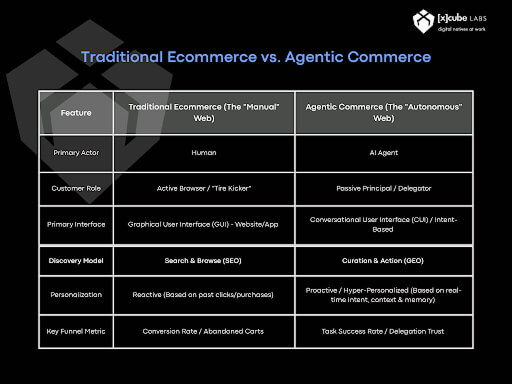 1-800-805-5783
1-800-805-5783 
While traditional online shopping has dominated the digital marketplace for decades, a new paradigm is emerging that promises to fundamentally transform how consumers discover, evaluate, and purchase products.
This transformation is powered by Agentic Commerce, a revolutionary approach where autonomous AI systems make decisions and take actions on behalf of shoppers and businesses.
Agentic Commerce represents the next evolution in digital retail, moving beyond simple chatbots and recommendation engines to intelligent systems that can autonomously complete complex tasks with minimal human intervention.
Unlike traditional eCommerce, where customers must navigate websites, compare options, and manually complete transactions, Agentic Commerce leverages AI agents that understand intent, make informed decisions, and execute purchases independently.
According to Gartner’s research, by 2028, at least 15% of day-to-day work decisions will be made autonomously through agentic AI, up from 0% in 2024.
Furthermore, Gartner predicts that by 2029, agentic AI will autonomously resolve 80% of common customer service issues without human intervention, leading to a 30% reduction in operational costs.
Traditional eCommerce has served businesses and consumers well for over two decades.
In this model, customers actively browse product catalogs, read reviews, compare prices, add items to shopping carts, and complete checkout processes themselves.
While innovations like one-click ordering and personalized recommendations have streamlined the experience, the fundamental structure remains human-driven.
Forrester forecasts that global retail e-commerce sales will reach $6.8 trillion by 2028, accounting for 24% of global retail sales.
Despite this impressive growth, traditional e-commerce still requires significant manual effort from consumers, from initial product discovery to final purchase.
Agentic AI ecommerce fundamentally reimagines the shopping journey. Instead of consumers spending hours researching products, comparing specifications, and hunting for the best deals, AI agents for e-commerce can handle these tasks autonomously.
These intelligent systems can understand complex requests, navigate multiple websites, negotiate prices, and complete transactions, all while adhering to predefined preferences and budgets.

The adoption of Agentic Commerce is accelerating rapidly among retailers.
According to Salesforce’s Connected Shoppers Report, 43% of retailers are currently piloting autonomous AI, while another 53% are evaluating its uses. Moreover, 75% of retailers believe AI agents will be essential for maintaining a competitive edge by 2026.
In traditional eCommerce, humans make all purchasing decisions. Agentic Commerce shifts this paradigm by empowering AI systems to make autonomous decisions within specified parameters. For instance, an e-commerce AI agent might automatically reorder household essentials when supplies run low, or find the best deals on specific products without requiring step-by-step human direction.
Traditional eCommerce requires customers to actively navigate websites, filter search results, and manually complete transactions. Agentic Commerce creates a passive, low-effort experience where customers simply state their needs, and AI agents handle the complexity. Gartner describes this as “paving the way for autonomous and low-effort customer experiences.”
Where traditional shopping might take hours of browsing and comparison, agentic AI ecommerce systems can analyze thousands of options in seconds. Forrester research shows that 28% of business buyers who used generative AI to inform their purchasing decisions report spending less time conducting research. In comparison, 57% consider more or different vendors due to these AI tools.
Traditional eCommerce offers personalization based on browsing history and past purchases. Agentic Commerce takes this exponentially further by understanding context, anticipating needs, and making proactive recommendations. These systems can consider factors like budget constraints, delivery preferences, brand loyalty, and even predict future needs based on consumption patterns.

The transformation from theory to practice is already underway. Agentic commerce examples are emerging across major retailers:
Amazon’s Seller Assistant now uses agentic AI to monitor inventory levels, flag slow-moving products, recommend markdowns, and schedule shipments autonomously.
According to Amazon, the agent was trained on 25 years of shopping data to help merchants navigate volatile demand.
Creative Studio Automation: Amazon’s AI-powered Creative Studio enables sellers to generate professional-quality advertisements through simple conversational prompts.
One seller reported a 338% increase in click-through rates and 121% return on ad spend using these agentic commerce tools, showcasing the power of AI in sales.
OpenAI’s Instant Checkout: Recently launched, this feature enables users to purchase products directly within ChatGPT from retailers like Etsy and Shopify without leaving the conversation interface, a perfect example of zero-click commerce powered by Agentic Commerce.
Despite its promise, Agentic Commerce faces significant hurdles. Gartner predicts that over 40% of agentic AI projects will be canceled by the end of 2027 due to escalating costs, unclear business value, or inadequate risk controls.
Of the thousands of vendors claiming to offer agentic solutions, Gartner estimates that only about 130 actually provide genuine agentic features.
Trust remains a critical barrier. According to Forrester’s April report, only 23% of online adults in the U.S. are comfortable sharing personal information with generative AI tools.
Retailers must prioritize transparency and data privacy to establish the trust necessary for widespread adoption of Agentic Commerce.
The future is unlikely to see traditional eCommerce disappear entirely. Instead, we’re heading toward a hybrid model where Agentic Commerce coexists with traditional shopping experiences.
As Forrester analyst Emily Pfeiffer notes, “The future of guided selling will be a hybrid of traditional browse/search interfaces and a chat-based shopping assistant.”
Currently, only 24% of U.S. online adults have used ChatGPT, according to Forrester’s 2025 Consumer Benchmark Survey.
However, consumer interest is growing. A recent Forrester survey found that 36% of U.S. adults are interested in delegating an AI agent to book reservations for travel, concerts, and other experiences.
For retailers navigating this transition, Gartner recommends pursuing agentic AI only where it delivers clear value or measurable ROI.
“To get real value from agentic AI, organizations must focus on enterprise productivity, rather than just individual task augmentation,” says Anushree Verma, Senior Director Analyst at Gartner.
Gartner’s analysis indicates that by 2028, 33% of enterprise software applications will include agentic AI, up from less than 1% in 2024.
Retailers who strategically invest now in the right use cases, such as customer service automation, inventory management, personalized marketing, and supply chain optimization, will be positioned to lead in this new era.
Agentic Commerce represents more than just incremental improvement over traditional eCommerce; it’s a fundamental reimagining of the buyer-seller relationship.
While challenges around cost, trust, and implementation complexity remain, the trajectory is clear: autonomous AI agents for e-commerce will increasingly handle tasks that previously required human intervention.
The question isn’t whether Agentic Commerce will transform retail, but rather how quickly and to what extent it will.
Retailers who understand what agentic commerce is and begin experimenting with these technologies today, while maintaining focus on genuine value creation and customer trust, will be best positioned to thrive in this new landscape.
As we move forward, the most successful eCommerce strategies will likely blend the best of both worlds: the browsing and discovery elements that consumers still enjoy from traditional eCommerce, enhanced by the efficiency and intelligence that Agentic Commerce provides.
The future of shopping isn’t about choosing between human and AI, it’s about finding the right balance that serves customers best.
It is a new retail model where autonomous AI agents—not humans—research, evaluate, and execute purchases on behalf of shoppers with minimal intervention.
Traditional shopping requires you to manually browse and click. Agentic Commerce is autonomous; the AI handles the searching, comparing, and buying for you.
Yes. Amazon uses it for inventory and ad automation, and OpenAI recently launched “Instant Checkout” to let users buy products directly inside ChatGPT.
Cost and trust. Gartner predicts many projects may fail due to high costs, and consumer willingness to share data with AI remains low (around 23%).
No. The future is likely “hybrid,” where traditional browsing coexists with AI agents that handle specific, complex, or mundane tasks.
At [x]cube LABS, we craft intelligent AI agents, including chatbots in healthcare, that seamlessly integrate with your systems, enhancing efficiency and innovation:
Integrate our Agentic AI solutions to automate tasks, derive actionable insights, and deliver superior customer experiences effortlessly within your existing workflows.
For more information and to schedule a FREE demo, check out all our ready-to-deploy agents here.